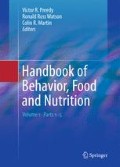Abstract
A century of research has shown that memory is malleable, meaning that it involves reconstruction and is even susceptible to complete fabrication. It could be said that false memories are ubiquitous, sometimes occurring spontaneously and sometimes as a result of external suggestion. Recent research has shown that false memories about having gotten sick from particular foods in childhood can be planted through suggestion and that these false memories can have consequences for people. The false memories can affect what people tell you they want to eat at a party and even how much of a particular food they actually eat. False memories about getting sick may lead people to avoid the food, while false memories of a positive nature can incite people to embrace the food. Similar false memories can be planted about beverages containing alcohol; people can be led to falsely remember these experiences and these false memories affect drinking attitudes and behaviors. Several key issues arise concerning these false food and alcohol memories. For example, who is susceptible to having their memories distorted in this way, and, conversely, who is resistant? What types of foods and beverages are particularly susceptible to false memory formation? Can these techniques be used in practical ways to influence nutritional selection and dieting? Given the obesity problem in Western society, false memory diets might make a significant applied contribution to its solution. We discuss these issues, in addition to ethical concerns.
Access this chapter
Tax calculation will be finalised at checkout
Purchases are for personal use only
Abbreviations
- FBPQ:
-
Food and beverage preferences Questionnaire
References
Alter AL, Oppenheimer DM. Uniting the tribes of fluency to form a metacognitive nation. Pers Soc Psychol Rev. 2009;13:219–235.
Anant SS (1967) Can Psychologist. 8a:19–22
Bartlett FC. Remembering: a study in experimental and social psychology. Cambridge: Cambridge University Press; 1932.
Bernstein DM, Laney C, Morris EK, Loftus EF. Soc Cognition. 2005a;23:11–34.
Bernstein DM, Laney C, Morris EK, Loftus EF. P Natl Acad Sci USA. 2005b;102:13724–31.
Bernstein DM, Godfrey R, Loftus EF. In: Markman KD, Klein WMP, Suhr JA, editors. The handbook of imagination and mental simulation. New York: Psychology Press; 2009. p. 89–112.
Birch LL. Annu Rev Nutr. 1999;19:41–62.
Bransford JD, Johnson MK. In: Chase WG, editor. Visual information processing. New York: Academic; 1973. p. 383–438.
Cautela JR. Psychol Rec. Treatment of compulsive behavior by covert sensitization. 1966;16:33–41.
Cautela JR. Psychol Rep. 1967;20:459–68.
Cautela JR, Kearney AJ. The covert conditioning handbook. New York: Springer; 1986.
Clifasefi SL, Bernstein DM, Wakefield B, Loftus EF (submitted).
Davidson WS. Psychol Bull. 1974;81:S71–81.
Falciglia GA, Couch SC, Gribble LS, Pabst SM, Frank R. J Am Diet Assoc. 2000;100:1474–81.
Galee BG Jr. Neurosci Biobehav R. 1996;20:67–73.
Garcia J, Koelling RA. Psychon Sci. 1966;4:123–4.
Garry M, Manning CG, Loftus EF, Sherman SJ. Psychon B Rev. 1996;3:208–14.
Geraerts E, Bernstein DM, Merckelbach H, Linders C, Raymaekers L, Loftus EF. Psychol Sci. 2008;19:749–753.
Gustavson CR, Nicolaus LK. In: Frank H, editor. Man and wolf: advances, issues, and problems in captive wolf research. Boston: W. Junk; 1987. p.169–203.
Gustavson CR, Garcia J, Hankins WG, Rusiniak K. Science 1974;184:581–3.
Hyman IE Jr, Billings FJ. Memory 1998;6:1–20.
Hyman IE Jr, Husband TH, Billings FJ. Appl Cognitive Psych. 1995;9:181–97.
Kraft T, Kraft D. Contemp Hypn. 2005;22:202–9.
Laney C, Morris EK, Bernstein DM, Wakefield BM, Loftus EF. Exp Psychol. 2008a;55:291–300.
Laney C, Kaasa S, Morris EK, Berkowitz SR, Bernstein DM, Loftus EF. Psychol Res. 2008b;72:362–75.
Laney C, Bowman-Fowler N, Nelson KJ, Bernstein DM, Loftus EF. Acta Psychol. 2008c;129:190–7.
Lindsay DS, Hagen L, Read JD, Wade KA, Garry M. True photographs and false memories. Psychol Science 2007;15:149–154.
Little ML, Curran JP. Psychol Bull. 1978;85:513–31.
Loewen R, Pliner P. Appetite 1999;32:351–66.
Loftus E, Bernstein DM. In: Healy A, editor. Experimental cognitive psychology and its applications. Washington, DC: American Psychological Association Press; 2005. p. 101–13.
Loftus EF, Pickrell JE. Psychiat Ann. 1995;25:720–5.
Loftus EF, Miller DG, Burns HJ. J Exp Psychol-Hum L. 1978;4:19–31.
Martins Y. Pediatr Basics. 2002;98:12–20.
Martins Y, Pliner P. Appetite 2005;45:214–24.
Martins Y, Pliner P. Appetite 2006;46:75–85.
Martins Y, Pelchat ML, Pliner P. Appetite 1997;28:89–102.
Mazzoni GAL, Loftus EF, Kirsch I. J Exp Psychol-Appl.2001; 7:51–9.
Mennella JA, Coren P, Jagnow MS, Beauchamp GK. Pediatrics 2001;107: e88.
Orne MT. Am Psychol. 1962;17:776–83.
Pezdek K, Finger K, Hodge D. Planting false childhood memories: The role of event plausibility. Psychol Science 1997;8:437–441.
Pezdek K, Freyd JJ. Anal Soc Issues Public Policy. 2009;9:177–83.
Pliner P. Appetite 1982;3:283–90.
Roediger HL, McDermott KB. J Exp Psychol Learn. 1995;21:803–14.
Rozin P. In: Rosenblatt J, Hinde RA, Beer C, Shaw E, editors. Advances in the study of behavior, vol. 6. New York: Academic; 1976. p. 21–76.
Rozin P, Fallon AE. Psychol Rev. 1987;94:23–41.
Scoboria A, Mazzoni G, Kirsch I, Relyea M. Appl Cognit Psychol. 2004;18:791–807.
Scoboria A, Mazznoi G, Jarry J. Acta Psychol. 2008;128:304–9.
Scott CL, Downey RG. J Psychol-Interdiscip Appl. 2007;141:127–34.
Sullivan SA, Birch LL. Pediatrics 1994;93:271–7.
Wade KA, Garry M, Read JD, Lindsay DS. Psychon B Rev. 2002;9:597–603.
Whittlesea BWA, Leboe JP. J Exp Psychol Gen. 2003;129:84–106.
Wudarzewski A, Mantonakis A, Clifasefi S, Bernstein DM, Loftus EF. False past experiences can shape current preferences. Poster presented at the Society for Judgment and Decision Making, Boston, MA; 2009, November.
Acknowledgments
This work was supported by a. 6 Professional Development grant and a Minor Research Grant to D.M.B. from Kwantlen Polytechnic University. We would like to thank Lori Scanlan for help with preparing the figures.
Author information
Authors and Affiliations
Corresponding author
Editor information
Editors and Affiliations
Rights and permissions
Copyright information
© 2011 Springer Science+Business Media, LLC
About this chapter
Cite this chapter
Bernstein, D.M., Pernat, N.L.M., Loftus, E.F. (2011). The False Memory Diet: False Memories Alter Food Preferences. In: Preedy, V., Watson, R., Martin, C. (eds) Handbook of Behavior, Food and Nutrition. Springer, New York, NY. https://doi.org/10.1007/978-0-387-92271-3_107
Download citation
DOI: https://doi.org/10.1007/978-0-387-92271-3_107
Published:
Publisher Name: Springer, New York, NY
Print ISBN: 978-0-387-92270-6
Online ISBN: 978-0-387-92271-3
eBook Packages: MedicineMedicine (R0)

